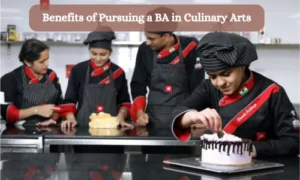Recently updated on May 23rd, 2025 at 04:57 am
In the area of higher education, the Bachelor of Arts (BA) in Culinary Arts stands as a respected degree that mixes creativity, culinary expertise, and business savvy. This degree not only hones practical cooking skills but also goes deep into the cultural, historical, and management aspects of the culinary business. If you have a passion for food and aim to make an impact in the culinary world, earning a BA in Culinary Arts could be your route to a successful profession.
1. Understanding the Curriculum

A BA in Culinary Arts curriculum often balances theoretical understanding with hands-on practice. Here’s a look at what you can expect.
- Culinary Techniques: Learning culinary techniques is at the centre of the curriculum. Under the direction of seasoned chefs, students learn everything from fundamental knife skills to sophisticated cooking techniques.
- Nutrition and Food Science: It’s important to comprehend the science underlying food. Principles of nutrition, food safety, and the effects of ingredients on health are frequently included in courses.
- Gastronomy: Gastronomy classes examine how food impacts cultures and identities worldwide by delving into the cultural and historical background of food.
- Hospitality and Business Management: Future chefs can also pursue a degree in hospitality management, which covers topics such as menu planning, cost management, and customer service in restaurants.
- Creativity and Innovation: Courses that emphasise food styling, experimental cooking, and culinary arts entrepreneurship promote innovation in the culinary arts.
2. Practical Experience
Hands-on learning is a cornerstone of every credible BA in Culinary Arts program. Students often spend a large amount of time in cutting-edge kitchens, applying theoretical knowledge to real-world circumstances. This hands-on experience not only improves students’ cooking skills but also prepares them for the fast-paced and demanding environment of professional kitchens.
3. Career Opportunities

Graduates of BA in Culinary Arts programs can choose from a variety of career paths:
- Executive Chef: Leading kitchen operations in restaurants, hotels, or resorts.
- Pastry Chef: Specialises in desserts and baked goods.
- Food Stylist: Creating visually appealing food presentations for photography and media.
- Culinary Educator: Teaching aspiring chefs in culinary schools.
- Food Entrepreneur: Starting their own catering business, food truck, or restaurant.
4. Benefits of Pursuing a BA in Culinary Arts

- Versatility: The skills gained are applicable across various culinary settings, from fine dining establishments to healthcare facilities.
- Networking: Students often benefit from networking opportunities with industry professionals, guest chefs, and alumni who are established in the field.
- Passion-Driven: For those passionate about food, pursuing a BA in Culinary Arts allows them to turn their hobby into a lifelong career.
- Global Perspective: Understanding different culinary traditions and flavours provides a global perspective that is invaluable in today’s interconnected world.
Conclusion
In conclusion, a Bachelor of Arts in Culinary Arts provides aspiring chefs with a comprehensive education that combines technical expertise with a deep understanding of culinary arts and business management. Whether your dream is to run a Michelin-starred restaurant or innovate in food technology, this degree equips you with the skills and knowledge to thrive in the dynamic and competitive culinary industry.






